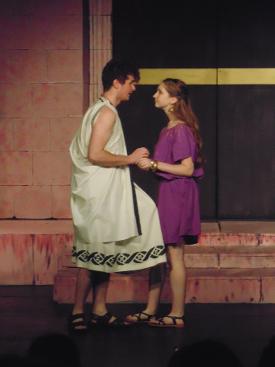
A very old musical comedy
from the original by Aristophanes
from the original by Aristophanes
In 411 B.C., Athens and her Empire were in the middle of a war against Sparta and her Pelopennesian allies -- a Greek civil war, in fact.
The war had dragged on for nearly twenty years, with no end in sight.
One spring morning, an Athenian playwright named Aristophanes put on the stage a daring, insightful and provocative (and sexy) play about the need to end the war. The play was Lysistrata and 2,420+ years later, it is as daring, insightful and provocative (and sexy) as it was all those centuries ago.
This is the ultimate "women's empowerment" play!
One spring morning, an Athenian playwright named Aristophanes put on the stage a daring, insightful and provocative (and sexy) play about the need to end the war. The play was Lysistrata and 2,420+ years later, it is as daring, insightful and provocative (and sexy) as it was all those centuries ago.
This is the ultimate "women's empowerment" play!
(Except maybe for Medea, but we won't go into that.)
With Greece in a semi-permanent state of war, Athenian housewife Lysistrata comes up with a strategy to bring the conflict to an end and enlists the aid of all of the women of Greece. The plan is simple: "No piece without a peace."
The women of Athens occupy the Acropolis and vow to withhold
sex from their husbands until the war is stopped.
It's hard for them, but then, it's hard for the men, too.
How long can the men hold out? How long can the women hold out?
The women of Athens occupy the Acropolis and vow to withhold
sex from their husbands until the war is stopped.
It's hard for them, but then, it's hard for the men, too.
How long can the men hold out? How long can the women hold out?
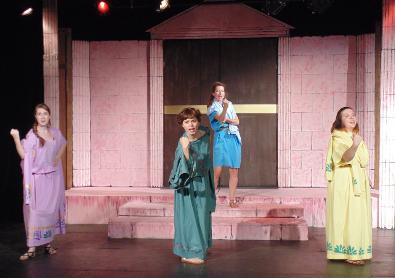
Some audience comments from the premiere production (August 2017)
"Naughty -- but fun"
"Hilarious"
"Hilarious"
"I love it!"
"It's an education!"
"It's an education!"
"Thoroughly enjoyed!"
"Entertaining and hilarious!"
"That was jaw-dropping!"
"They should do this in New York."
"That was jaw-dropping!"
"They should do this in New York."
Above: Lysistrata's Plan -- "They cannot stand for long, if they have to stand for long."
Below: It gets physical -- just not the way the men want.
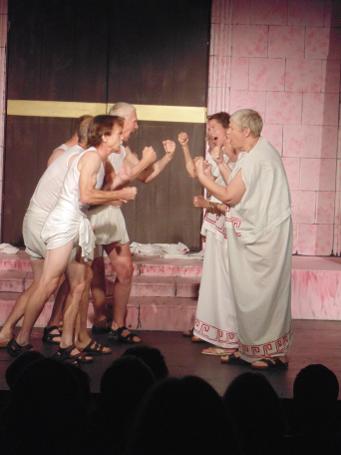
With a brand new script of fast and funny dialogue, a score of snappy, jazzy songs that both send up and pay tribute to the classical style and a new twist in the tail that gives the show some extra bite,
David Jacklin's LYSISTRATA
is fun and entertaining theatre and as well as being smart and thought-provoking.
David Jacklin's LYSISTRATA
is fun and entertaining theatre and as well as being smart and thought-provoking.
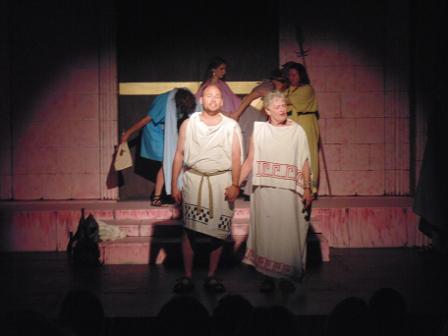
Philostratus and Stratyllis explain that "There is no happy ending to this play."
MUSICAL NUMBERS
Act One
A Greek Overture
Athens
Lysistrata's Plan
A Greek Scene Change
The Entrance of the Chorus
Shut Your Mouth
Athens
Lysistrata's Plan
A Greek Scene Change
The Entrance of the Chorus
Shut Your Mouth
Another Greek Scene Change
All You Men
All You Men, reprise
Lycon, My Husband
All You Men
All You Men, reprise
Lycon, My Husband
Act Two
A Greek Entr'Acte
O, Melanion
Baby, I'm Not Sayin' I Don't Love You
Baby, I'm Not Sayin', reprise
The Entrance of Reconciliation
My Mama Never
Io Paean
When Sparta's Army Ruled The Hills
Io Paean, reprise
A Greek Curtain Call
O, Melanion
Baby, I'm Not Sayin' I Don't Love You
Baby, I'm Not Sayin', reprise
The Entrance of Reconciliation
My Mama Never
Io Paean
When Sparta's Army Ruled The Hills
Io Paean, reprise
A Greek Curtain Call
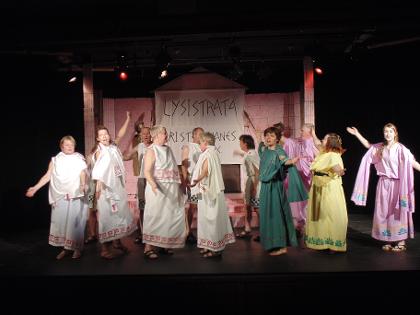
The Company announce the play "Lysistrata, by Aristophanes!"
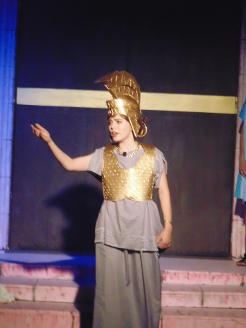
Lysistrata appears as Athena
Characters
Lysistrata: an Athenian woman, the ringleader
Calonice: her earthy BFF and neighbour
Myrrhine: a young Athenian woman, newly married
Lampito: a Spartan woman, all muscle
The Magistrate: a city father of Athens
Cinesias: the soldier-husband of Myrrhine
Stratyllis: the leader of the women's chorus
Philostratus: the leader of the men's chorus
A Spartan herald
Calonice: her earthy BFF and neighbour
Myrrhine: a young Athenian woman, newly married
Lampito: a Spartan woman, all muscle
The Magistrate: a city father of Athens
Cinesias: the soldier-husband of Myrrhine
Stratyllis: the leader of the women's chorus
Philostratus: the leader of the men's chorus
A Spartan herald
Spartan Delegates
Athenian Delegates
A Chorus of Old Women
A Chorus of Old Men
Other young women and men
A Chorus of Old Women
A Chorus of Old Men
Other young women and men
Instrumentation:
Flute
2 Trumpets
2 Trombones
Tuba (or Baritone)
Harp (or keyboard)
Piano
Double Bass
Percussion
Flute
2 Trumpets
2 Trombones
Tuba (or Baritone)
Harp (or keyboard)
Piano
Double Bass
Percussion
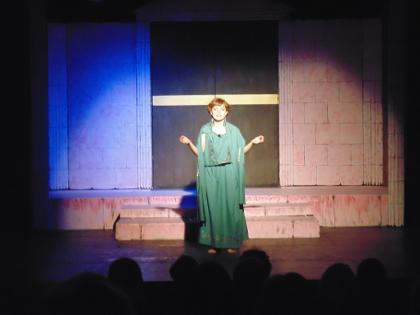
Above: Lysistrata's song "Lycon, My Husband" is based on fragments of ancient Greek music that are among the oldest notated music in existence. One fragment was actually written by Euripides, himself!
Below: Spartan and Athenian negotiate a peace -- divvying up the various parts of luscious Reconciliation.
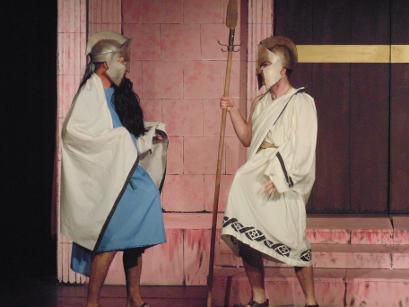
A Spartan meets an Athenian -- tensions rise.
Details:
2 acts; 90 minutes plus intermission
12-14 male/12-14 female
unit set with additions
piano with percussion, multiple keyboards with percussion or 9 piece orchestra
2 acts; 90 minutes plus intermission
12-14 male/12-14 female
unit set with additions
piano with percussion, multiple keyboards with percussion or 9 piece orchestra
